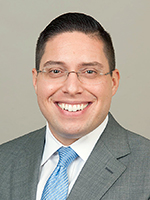J. Joel Alicea
2017 Temple Bar Scholar Report
 We came to Britain at a challenging time for the nation and the legal profession. It was a time of great uncertainty. With so much unsettled, all of legal London seemed eager to debate the past and discuss the future. It was a wonderful time to be a Temple Bar Scholar.
We came to Britain at a challenging time for the nation and the legal profession. It was a time of great uncertainty. With so much unsettled, all of legal London seemed eager to debate the past and discuss the future. It was a wonderful time to be a Temple Bar Scholar.
Our trip began with a week in which we met many of Britain’s foremost legal figures. One moment we were meeting with the Lord Chief Justice of England and Wales and the next we were conversing with the chairman of the Bar Council. We were at Westminster Abbey—and then we were at the Old Bailey. With each event, I gained a better sense of the workings of the British legal system and the contours of the legal profession.
Then it was off to our respective assignments in barrister chambers for the next two weeks. Each chambers had its own distinct character and vibe, and each welcomed me warmly. I was astonished at how generous my hosts were with their time. In addition to being given opportunities to observe trial and appellate proceedings, I was privileged to spend hours in conversation with barristers discussing law and politics.
Our time concluded with a week at the Supreme Court, where I was overwhelmed by the hospitality and generosity of the Justices and their judicial assistants. We were fortunate to be at the Court when it was hearing a particularly interesting case, and we were given a window into the inner workings of this new and critical institution of British government.
Throughout our weeks in London, our conversations repeatedly returned to challenges confronting Britain. The first, of course, was Brexit. It was the ever-present topic, the source of anxiety and curiosity. All conversation seemed to touch on it, and rarely did it do so without eliciting strong reactions. But while Brexit shifted the ground beneath legal London’s feet, it is not the only source of uncertainty. There is the changing nature of the legal profession and the strain it has placed on the old ways and structures. How will the traditional concept of the barrister adapt to a changing world? What part will the Inns of
Court play in the future of the bar? What role will the U.K. Supreme Court play in the future of British society?
The answers to all of these questions are unknown, and it was exciting to hear them debated during our stay in London. Participating in the Temple Bar program is an extraordinary opportunity in any year, but doing so in a time of great political and legal ferment made it especially engaging and enlightening.
J. Joel Alicea is a clerk for Associate Justice Samuel A. Alito of the Supreme Court of the United States. Alicea is an alumnus of Princeton University, where he graduated summa cum laude with a degree in politics. He is a member of Phi Beta Kappa and was awarded the Harold Willis Dodds Prize as the senior who best embodies the characteristics of clear thinking, moral courage, and a judicious regard for the opinions of others. Alicea earned his J.D. cum laude from Harvard Law School, where he served as president of the Harvard Federalist Society and Notes Editor of the Harvard Journal of Law & Public Policy. He received the Dean’s Award for Community Leadership. In his personal statement for the Pegasus Scholar application, Alicea wrote of growing up in West Germany, Puerto Rico, and Mexico, and key world events that inspired his interest in foreign relations law.